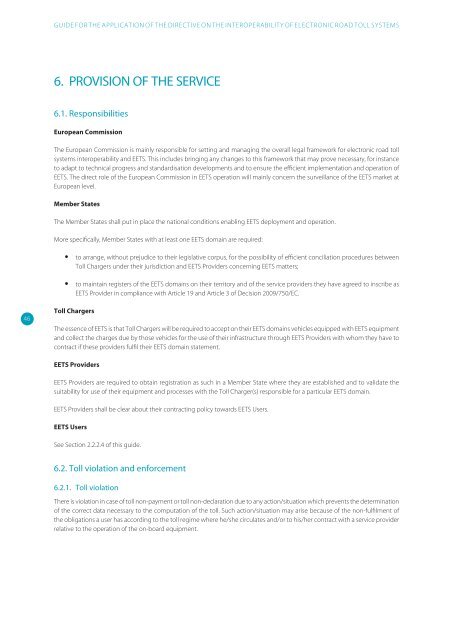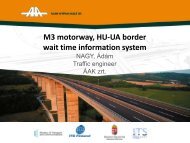The European Electronic Toll Service (EETS)
The European Electronic Toll Service (EETS) - ITS Hungary Egyesület
The European Electronic Toll Service (EETS) - ITS Hungary Egyesület
- No tags were found...
Create successful ePaper yourself
Turn your PDF publications into a flip-book with our unique Google optimized e-Paper software.
GUIDE FOR THE APPLICATION OF THE DIRECTIVE ON THE INTEROPERABILITY OF ELECTRONIC ROAD TOLL SYSTEMS<br />
6. PROVISION OF THE SERVICE<br />
6.1. Responsibilities<br />
<strong>European</strong> Commission<br />
<strong>The</strong> <strong>European</strong> Commission is mainly responsible for setting and managing the overall legal framework for electronic road toll<br />
systems interoperability and <strong>EETS</strong>. This includes bringing any changes to this framework that may prove necessary, for instance<br />
to adapt to technical progress and standardisation developments and to ensure the efficient implementation and operation of<br />
<strong>EETS</strong>. <strong>The</strong> direct role of the <strong>European</strong> Commission in <strong>EETS</strong> operation will mainly concern the surveillance of the <strong>EETS</strong> market at<br />
<strong>European</strong> level.<br />
Member States<br />
<strong>The</strong> Member States shall put in place the national conditions enabling <strong>EETS</strong> deployment and operation.<br />
More specifically, Member States with at least one <strong>EETS</strong> domain are required:<br />
• to arrange, without prejudice to their legislative corpus, for the possibility of efficient conciliation procedures between<br />
<strong>Toll</strong> Chargers under their jurisdiction and <strong>EETS</strong> Providers concerning <strong>EETS</strong> matters;<br />
• to maintain registers of the <strong>EETS</strong> domains on their territory and of the service providers they have agreed to inscribe as<br />
<strong>EETS</strong> Provider in compliance with Article 19 and Article 3 of Decision 2009/750/EC.<br />
46<br />
<strong>Toll</strong> Chargers<br />
<strong>The</strong> essence of <strong>EETS</strong> is that <strong>Toll</strong> Chargers will be required to accept on their <strong>EETS</strong> domains vehicles equipped with <strong>EETS</strong> equipment<br />
and collect the charges due by those vehicles for the use of their infrastructure through <strong>EETS</strong> Providers with whom they have to<br />
contract if these providers fulfil their <strong>EETS</strong> domain statement.<br />
<strong>EETS</strong> Providers<br />
<strong>EETS</strong> Providers are required to obtain registration as such in a Member State where they are established and to validate the<br />
suitability for use of their equipment and processes with the <strong>Toll</strong> Charger(s) responsible for a particular <strong>EETS</strong> domain.<br />
<strong>EETS</strong> Providers shall be clear about their contracting policy towards <strong>EETS</strong> Users.<br />
<strong>EETS</strong> Users<br />
See Section 2.2.2.4 of this guide.<br />
6.2. <strong>Toll</strong> violation and enforcement<br />
6.2.1. <strong>Toll</strong> violation<br />
<strong>The</strong>re is violation in case of toll non-payment or toll non-declaration due to any action/situation which prevents the determination<br />
of the correct data necessary to the computation of the toll. Such action/situation may arise because of the non-fulfilment of<br />
the obligations a user has according to the toll regime where he/she circulates and/or to his/her contract with a service provider<br />
relative to the operation of the on-board equipment.



